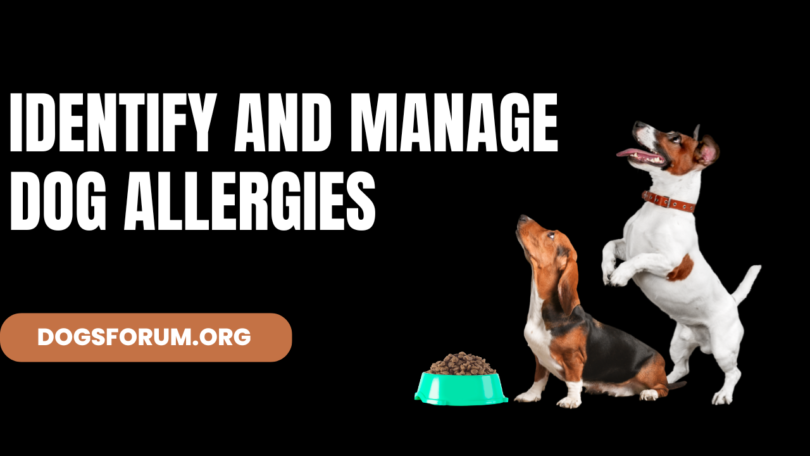As a pet owner, one of the most challenging issues you may face is dealing with your dog's allergies. Just like humans, dogs can suffer from various types of allergies that can affect their quality of life. This comprehensive manual will guide you through identifying and managing dog allergies effectively.
Understanding Dog Allergies
What Are Dog Allergies?
Dog allergies occur when a dog's immune system overreacts to a typically harmless substance, known as an allergen. These allergens can be found in food, the environment, or even on your dog's skin. The immune response can cause a range of symptoms, from mild itching to severe gastrointestinal issues.
Types of Dog Allergies
- Food Allergies: Triggered by specific ingredients in your dog's diet, such as beef, chicken, dairy, or grains.
- Environmental Allergies: Caused by allergens like pollen, mold, dust mites, and grasses.
- Flea Allergies: Result from flea bites, specifically the flea's saliva.
- Contact Allergies: Occur when a dog comes into direct contact with an allergen, such as certain shampoos, fabrics, or cleaning products.
Identifying Dog Allergies
Common Symptoms
- Itchy Skin: Persistent scratching, licking, or biting.
- Red, Inflamed Skin: Often seen on the paws, face, ears, and belly.
- Ear Infections: Frequent, recurring ear infections.
- Digestive Issues: Vomiting, diarrhea, or excessive gas.
- Respiratory Problems: Sneezing, coughing, or wheezing.
- Behavioral Changes: Increased irritability or lethargy.
Diagnostic Methods
1. Veterinary Examination
A thorough examination by a veterinarian is the first step in diagnosing allergies. They will review your dog's medical history, conduct a physical examination, and may recommend specific tests.
2. Elimination Diet
For food allergies, an elimination diet is often used. This involves feeding your dog a novel protein and carbohydrate source that they haven't eaten before. If symptoms improve, you can gradually reintroduce other foods to identify the allergen.
3. Allergy Testing
- Skin Tests: Small amounts of potential allergens are injected into your dog's skin to observe reactions.
- Blood Tests: Measures the level of antibodies to specific allergens in your dog's blood.
Managing Dog Allergies
Dietary Management
1. Hypoallergenic Dog Food
Hypoallergenic dog food is formulated with novel proteins and carbohydrates that are less likely to cause allergic reactions. Common options include duck, venison, and sweet potatoes.
2. Grain-Free Diet
Grain-free diets can be beneficial for dogs with grain allergies. These diets replace grains with alternative carbohydrates like sweet potatoes, peas, and lentils.
3. Homemade Dog Food
Preparing homemade dog food allows you to control the ingredients and avoid allergens. Consult with your veterinarian to ensure the diet is balanced and meets your dog's nutritional needs.
Environmental Management
1. Regular Cleaning
Keep your home clean to reduce exposure to environmental allergens like dust mites and mold. Regularly vacuum carpets, wash bedding, and use air purifiers.
2. Bathing
Frequent bathing with hypoallergenic shampoos can help remove allergens from your dog's skin and coat. Be sure to use a gentle, dog-specific shampoo to avoid drying out their skin.
3. Pest Control
Regular flea prevention is crucial for dogs with flea allergies. Use veterinarian-recommended flea control products and maintain a clean living environment to reduce flea infestations.
Medical Management
1. Antihistamines
Antihistamines can help reduce itching and other allergic reactions. Consult your veterinarian for appropriate dosages and options.
2. Steroids
Steroids may be prescribed for severe allergic reactions. They can effectively reduce inflammation and itching but should be used under veterinary supervision due to potential side effects.
3. Immunotherapy
Immunotherapy, or allergy shots, involves gradually exposing your dog to increasing amounts of the allergen to build tolerance. This treatment is typically recommended for environmental allergies and requires a long-term commitment.
Natural Remedies
1. Omega-3 Fatty Acids
Omega-3 fatty acids, found in fish oil supplements, can help reduce inflammation and improve skin health. They are a beneficial addition to your dog's diet for managing allergies.
2. Probiotics
Probiotics can support your dog's digestive health and strengthen their immune system. They are particularly useful for dogs with food allergies and gastrointestinal issues.
3. Herbal Remedies
Certain herbs, such as chamomile and calendula, have anti-inflammatory properties and can be used in topical treatments to soothe irritated skin. Always consult your veterinarian before using herbal remedies.
Creating an Allergy Management Plan
Step 1: Identify the Allergen
Work with your veterinarian to identify the specific allergen causing your dog's symptoms. This may involve diagnostic tests, elimination diets, and careful observation.
Step 2: Avoid the Allergen
Once the allergen is identified, take steps to avoid it. This may include changing your dog's diet, modifying their environment, or using preventative measures like flea control products.
Step 3: Implement Treatment
Based on your veterinarian's recommendations, implement appropriate treatments to manage your dog's symptoms. This may include medications, supplements, or natural remedies.
Step 4: Monitor and Adjust
Regularly monitor your dog's condition and make adjustments to their management plan as needed. Keep in close communication with your veterinarian to ensure your dog remains healthy and comfortable.
Step 5: Maintain Regular Vet Visits
Regular veterinary check-ups are essential for managing your dog's allergies. Your veterinarian can provide ongoing support, adjust treatments, and monitor your dog's overall health.
Tips for Pet Owners
Keep a Symptom Diary
Maintaining a symptom diary can help you and your veterinarian identify patterns and potential triggers. Record any changes in your dog's behavior, diet, environment, and symptoms.
Educate Yourself
Stay informed about dog allergies and management strategies. Knowledge is power, and understanding your dog's condition will help you make informed decisions about their care.
Be Patient
Managing dog allergies can be a long and sometimes frustrating process. Be patient and persistent in finding the right solutions for your dog.
Support Your Dog Emotionally
Allergies can be stressful for your dog. Provide plenty of love, attention, and comfort to help them feel secure and supported.
Join Support Groups
Consider joining online forums or local support groups for pet owners dealing with dog allergies. Sharing experiences and advice with others can be incredibly helpful.
By understanding the types of dog allergies, identifying symptoms, and implementing effective management strategies, you can significantly improve your dog's quality of life.
Remember, every dog is unique, so it's essential to find the approach that works best for your furry friend.











Leave a Comment